
The plan seemed like a good one at first.
A few years ago, Abby Speicher Carroll, MBA’15, was set to present at a business plan competition. Her business, DARTdrones, was a flight school for people learning to pilot drones, those increasingly common flying machines buzzing and soaring about the skies.
At the time of the competition, the company wasn’t much more than a concept and neither Carroll nor her team actually knew how to operate a drone. Regardless, they decided on a whim to order one so they could demonstrate how it flies as part of their presentation.
When the new drone arrived, however, it came with no instructions, or at least, no directions in English. The hour Carroll spent practicing how to fly it proved, in hindsight, to be comically inadequate. During the competition, as the drone lifted into the air, the judges watched eagerly. “They thought I had everything under control,” Carroll says.
That wasn’t exactly true. “It went the opposite way from what I expected,” she says. “It was flying right above the judges. They were scrambling to get away.” Her father, Chris Speicher, who also is a co-founder, tried to grab the drone out of the air. Eventually, it crash landed in front of Carroll, bringing the demonstration to an unceremonious end. “Everybody thought it was hilarious, but I literally still have nightmares about it,” says Carroll.
The entrepreneurial journey is often not a smooth ride, and a hard landing or two is to be expected. Building DARTdrones since that shaky flight, Carroll has experienced uncertainty, stress, and many long hours. But she understands that the startup process is an untidy, exhilarating mess, and she has come to thrive on it. “I love chaos. I love flux. If it’s not in flux, I make it in flux,” she says. “With any company, there are endless problems. This is how business is. You have to deal with it.”
Not that she has experienced only problems. There also have been triumphs, including an appearance on the TV show Shark Tank, and she relishes that DARTdrones is a family affair, with both her father and husband on board. Today, the venture offers training in 40 cities across the U.S., with instructors who have military and commercial flying expertise, and organizations are turning to DARTdrones to understand a technology that’s poised to become a ubiquitous part of our future.
On the Hunt
For years, drones were the purview of the military. Any civilian use seemed limited to hobbyists fooling around with drones in a park. That’s changing. Earlier this year, the Federal Aviation Administration announced that more than 1 million drones had been registered with the agency. Drones have been used to watch whales and document volcanic eruptions, to survey flood damage and find survivors after natural disasters, to check insurance claims and inspect power lines. UPS is testing delivery trucks outfitted with drones, and images taken by drones are common in movies and news broadcasts.
“There are endless possibilities,” says Colin Romberger, chief pilot and operations consultant at DARTdrones. “At this point, it is a wide-open canvas.” DARTdrones is well-suited to help companies figure out these many capabilities, but keeping up with the evolving industry and its steady changes in technology and regulation isn’t easy. Mike McCann, enterprise account manager at DARTdrones, gives credit to the forward-thinking Carroll. “She has got to be a year ahead, knowing what’s coming,” McCann says. “She is really on top of things. Abby amazes me.”
Carroll developed the concept for DARTdrones during her first year at Babson. She had come to the College determined to pursue an entrepreneurial venture—she just needed to figure out what that would be. It was a busy time. She had to contend with schoolwork, a graduate assistantship, and, to make ends meet, four babysitting gigs. True to her affinity for chaos, she also adopted a dog.
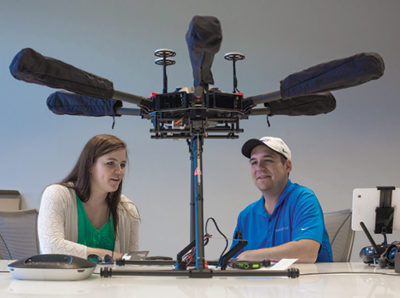
Abby Speicher Carroll and Colin Romberger, chief pilot and operations consultant at DARTdrones, examine a drone from a client.
Her studio apartment in Newton, Massachusetts, which she shared with future husband Mike Carroll, was crammed with paraphernalia, including a prototype for a baby pacifier designed to stayed attached to an infant’s face, equipment and ingredients for making mead and starting a meadery, and a snowboard training device about the size of a table. In all, she was pondering about 20 business ideas. “I was on the hunt,” she says. “I get excited about opportunities, and I can’t resist them.”
Carroll’s intensity isn’t surprising. Growing up in Dunmore, Pennsylvania, a small town near Scranton in the northeastern part of the state, she comes from a family of entrepreneurs. Her grandfather began a food brokerage when he was laid off from the A&P grocery chain, and her grandmother was district sales manager for Avon, supervising some 200 entrepreneurial women selling beauty products. Through the years, Carroll’s father has played various roles in about 30 startups and is now an entrepreneurship professor.
Whether in the classroom or in the many sports she played, Carroll had tenacity as a child, says her father. “She was always persistent,” Speicher says. “She always had that drive.” At 17, Carroll started her first business, a social enterprise that sold purses handmade by women in Ghana. She was inspired to launch the venture after accompanying her father on a trip to the country, and a portion of the profits went to fund children’s education there. For five years, Carroll worked on the business before finally deciding to move on, passing it along to a family friend to run, and the venture is still in operation today.
Carroll’s father also had a hand in the start of DARTdrones. As she debated what type of business to start at Babson, Speicher nudged her toward drones. Growing excited about the aircraft’s commercial potential, Speicher was fascinated when Amazon’s Jeff Bezos went on 60 Minutes in 2013 and demonstrated how a drone could deliver a package. “This is coming on,” Speicher would tell Carroll. “This is going to take over.” In time, she came to agree that drones could be a great business. But shaping and growing that business would be a long, trying process.
Frustration and Inspiration
Carroll began working on DARTdrones in early 2014. Soon enough, doubts followed.
As many entrepreneurs do when launching a business, Carroll first focused on market research. She identified potential competitors and customers, but the work felt unproductive. “Everything was so theoretical,” she says. “I would call people, asking, ‘What are your feelings toward drones?’” The months slipped by. No customers were in sight. By the fall, her classmates were looking ahead to graduation and applying for jobs, but Carroll was tethered to a far-from-solid business concept. “I was nervous,” she says. “DARTdrones was just fluttering around. I can see why people quit at that point.”
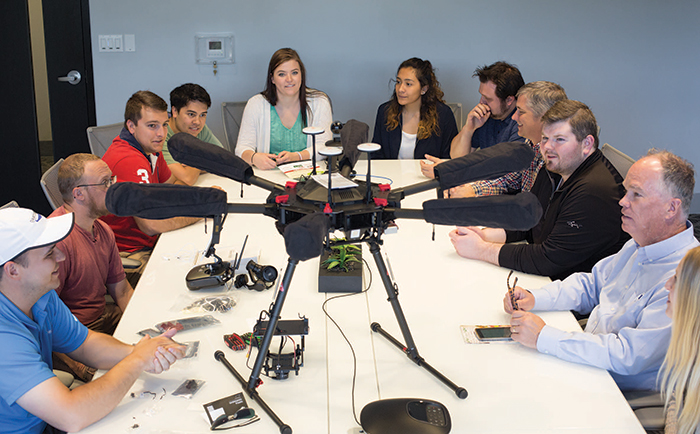
Abby Speicher Carroll and the staff at the DARTdrones office in Jessup, Pennsylvania, gather for a meeting.
Carroll decided to give herself till the winter break to decide whether to continue the business. But then her dad began pressing her with another idea. Why not sell drones, he proposed. The holiday season was coming, and a family friend was willing to invest $50,000. They could order a shipment of drones and then resell them. Drones promised to be a hot holiday gift.
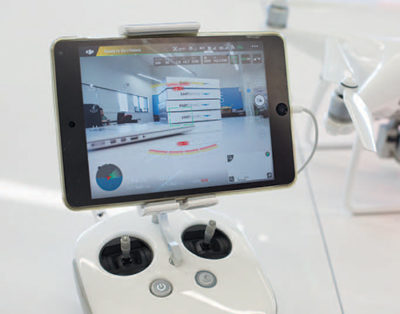
A controller for piloting a drone comes with a video screen that displays the aircraft’s surroundings.
While DARTdrones was envisioned originally as more of an all-encompassing company, one that would sell drones as well as offer instructional support, Carroll had long since decided that a focus on training was the way to go, particularly after her scary flight at the business competition demonstrated the need for such courses. Despite misgivings, she went along with her father’s idea. The hope was that their shipment of drones would come in by Black Friday, which would leave plenty of time to resell them.
That seemingly solid plan went awry, however, as the drones didn’t arrive until after Christmas. “We were stuck with all these drones,” says Carroll. “It was horrible.” Though she was able to sell some in the ensuing weeks, she admits that a bunch of unsold drones, their technology now outdated, are sitting in her parents’ home.
After that fiasco, Carroll was filled with frustration. But she soon had a flash of inspiration that would turn the business around. As someone who follows the industry, she saw that DJI, a leading drone manufacturer, was offering free demos. Carroll had a thought: What if DARTdrones piggybacked on the demos to attract customers? Partnering with DJI, DARTdrones began hosting events throughout the Northeast, presenting DJI’s two-hour demo and then offering a free DARTdrones training session. DARTdrones was able to interact with customers, receive feedback on its course, and spread the word about the company.
Sales took off, and, suddenly, the uncertainty of 2014 gave way to excitement in 2015. In the spring, DARTdrones won Babson’s prestigious BETA competition, and after Carroll’s May graduation, she participated in the College’s Summer Venture Program. Carroll gives much credit to Babson for helping her grow DARTdrones. The College left her with a network of friends to turn to for business advice, and it gave her confidence to know that, whatever issue she faces, there’s probably a case study from her Babson days that covers it. “I couldn’t have made it this far without Babson,” says Carroll, who also took part in the College’s Women Innovating Now Lab. “I’m like the Babson billboard. It was the perfect place for me.”
DARTdrones made a push for expansion through the rest of 2015, thanks in part to a rash comment by Carroll. While talking casually with the owner of DroneLife, an influential industry website, Carroll was told that the site couldn’t cover DARTdrones until it was a national company. “We have plans to go national,” Carroll responded. “By the end of this year, we’ll be national.” At the time, though, DARTdrones actually had no such plans, so Carroll’s mind raced. “I go home. I was like, we have to go national. What’s the plan?”
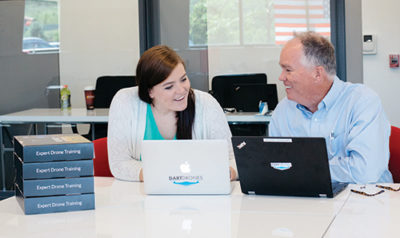
Abby Speicher Carroll talks with her dad and co-founder, Chris Speicher, an entrepreneurship professor at Marywood University.
A big obstacle to growth was finding enough qualified pilots to teach courses. Eventually, the company was able to recruit 13 pilots of commercial and military aircraft who had an interest in drone technology. The pilots were invited to a multiday train-the-trainer session, though the session’s location concerned Carroll. Because DARTdrones had no money to rent a training space, it had to make do with her parents’ house, with classes held inside and pilots practicing flying on the lawn. Carroll served the pilots mac and cheese and removed all pictures of herself to try to make the house look more professional. In the end, the pilots were trained and had a good time, and the company was on its way to going national.
Since then DARTdrones has continued to recruit instructors and today has about 35. Aviation is a male-dominated world, and as a young woman CEO, Carroll has encountered self-centered pilots who are dismissive of her. She doesn’t put up with them. “I have been deliberate about who joins the company,” Carroll says. “I have denied instructors who don’t seem like they could handle me being in charge.”
Then the Call Came
DARTdrones was on an upswing by the end of 2015, but the unpredictable entrepreneurial journey brought new challenges in 2016, with Carroll facing what she calls a “dark time.” A painful company shake-up, which she declines to talk about, was part of the reason. Beyond that, the long days spent building a venture were finally catching up to her. In a typical week, she worked 80 hours. “It wasn’t sustainable,” she says. “I was really burned out.”
To recharge, she went on a 10-day cruise with her parents and younger brother. The respite worked, and Carroll brought a new mindset back to DARTdrones. She vowed not to work as much, and away from the office, especially on weekends, she made a conscious effort to think less about the business. Not that she completely ditched her full, frenetic life. “She is not one to sit still,” says husband Mike Carroll, whom she married in 2017. For a time she took up painting, and then she and her husband remodeled a house, which meant hours of sanding, painting, and laying floors. Still, a change was noticeable. “The first year or two, every second of the day was DARTdrones,” says her husband. “She now has a different perspective.”
As the dark time subsided, Carroll got a call with major business implications. The previous year, she had applied to be on Shark Tank. Now the TV show called to say her application had been accepted. She would be pitching DARTdrones to the Sharks, the show’s panel of investors.
Carroll’s episode was taped in June 2016. “It was stressful leading up to it,” she says. “You’re worried, ‘What if I totally bomb?’” Thankfully, the taping went well, but afterward, she felt renewed stress. The exposure promised to boost DARTdrones’ business, but the network gave Carroll no indication of when her episode would air. So the company rushed to be ready, redoing its website and adding classes and instructors, while Carroll constantly checked the upcoming TV schedule.
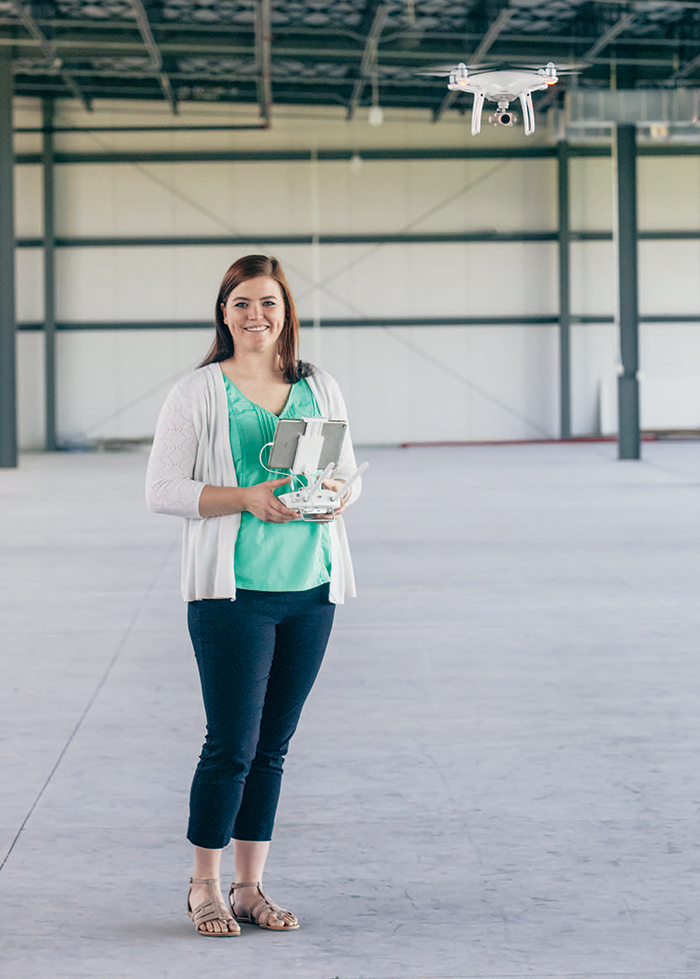
DARTdrones is located within a business center that supports and encourages startups. This large, unoccupied space, which is down the hall from DARTdrones, is slated for future businesses.
Ultimately, the episode didn’t air until February 2017. The night it premiered, Carroll’s parents threw a big party, their house packed with family, friends, and DARTdrones employees. Everyone marveled at Carroll’s poise on the screen, and once the show was over, they all cheered.
After the episode aired, DARTdrones experienced a surge in business. What the company didn’t receive from Shark Tank, however, was a deal. At the taping, Carroll had agreed to give Mark Cuban a 10 percent stake for $300,000, but once the paperwork came to make the deal official, Carroll had second thoughts. She couldn’t see herself giving up any control in the venture she had worked so hard to create. “Having someone in charge of me wasn’t going to work,” she says. “I can’t have a boss. I got into this to be my own boss.” In the end, the paperwork was left unsigned.
Today, thriving DARTdrones offers 40 classes a month across the U.S., and more than 8,000 students have taken its courses. Police and fire departments are big customers, with more than 100 having gone through DARTdrones programs. Although regulations keep some companies cautious about using drones, others are eager to embrace the aircraft’s potential, and so DARTdrones has been tailoring more programs to corporate clients, says Carroll.
Though DARTdrones has an office in Jessup, Pennsylvania, only a short drive from Carroll’s hometown of Dunmore, she and her husband make their home nowadays in Park City, Utah, near the company’s Salt Lake City office. The pair fell in love with the area while attending Salt Lake’s Westminster College, where they met.
Carroll’s husband joined the company in 2016 and serves as director of accounting. Initially, Carroll was nervous about blending her personal and professional lives. “After the first month, I thought it was the best thing,” she says. “It is really nice. We are never apart.” The two bring different strengths to the office, which helps them avoid stepping on each other’s toes. The creative Abby focuses on marketing and strategy, while numbers and logistics are the domain of analytical Mike.
Outside the office, Carroll keeps up her busy lifestyle. She hikes, camps, and snowboards. She also flies to Pennsylvania to visit family and check on the Jessup office. That office sits on a ridge overlooking a valley full of houses, highways, and communities. Standing there, Carroll looks out on a world she has known her entire life.
Despite all the ups and downs, Carroll remains passionate about entrepreneurship. “I hope I am a serial entrepreneur,” she says. “I hope I’ll use this experience for the next business I start.”
